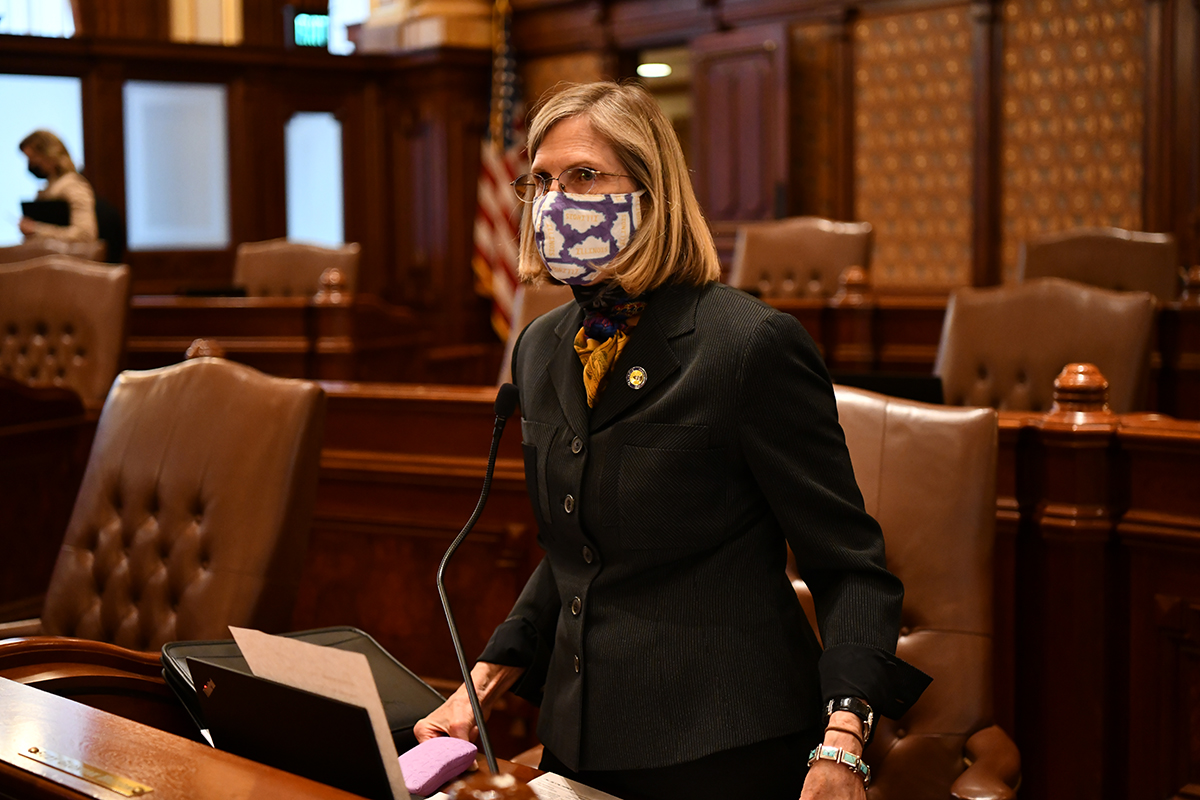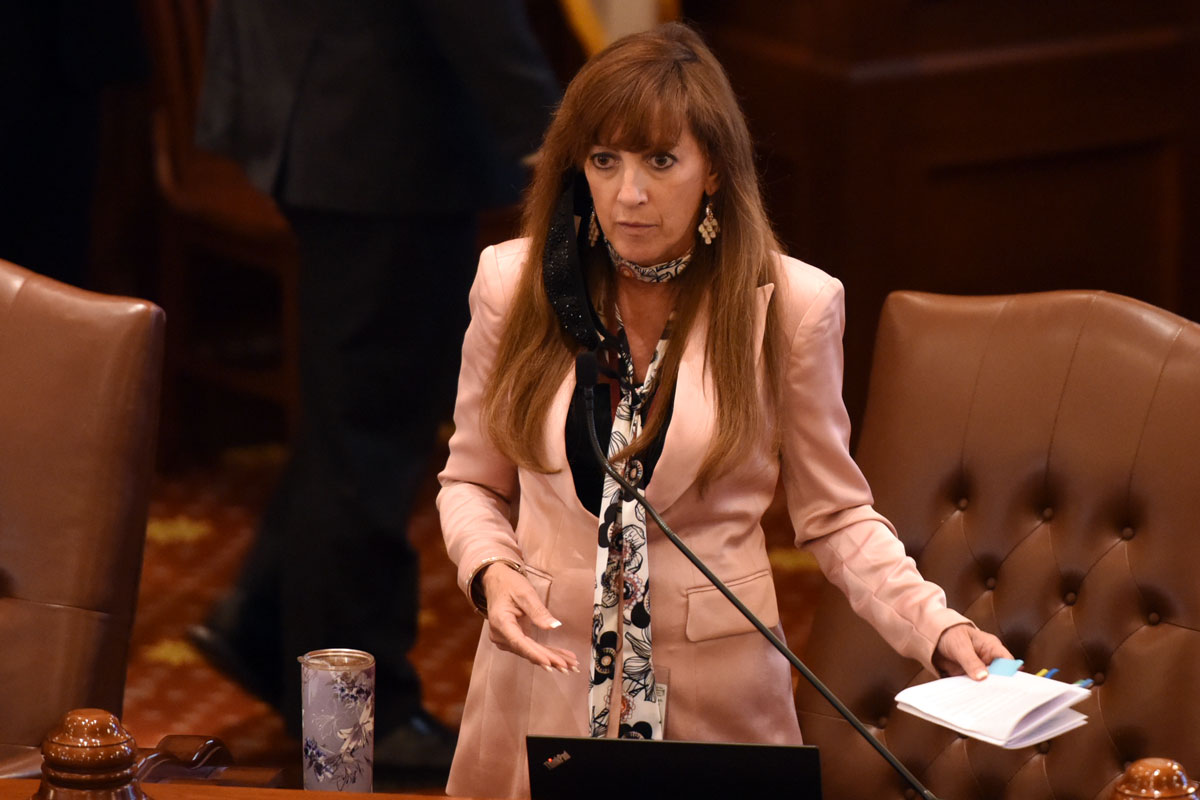- Details
- Category: Senator Sara Feigenholtz News

Measure also includes month-long vaccination incentive
SPRINGFIELD – A measure sponsored by State Senator Sara Feigenholtz (D-Chicago) expanding the state’s “cocktails-to-go” program was approved by the Senate Sunday and will head to the governor.
“The hospitality industry was hit the hardest by the pandemic,” Feigenholtz said. “Our favorite local bars and restaurants are the cornerstones of our communities. Sadly, we have lost many that were unable to survive the shutdown. This legislation will help restaurants and bars survive the pandemic by continuing cocktails-to-go delivery along with the other cash management methods.”
Senate Bill 104 extends the sunset on cocktails-to-go until Jan. 3, 2024, allows single servings of wine to be available for delivery, and allows for products filled, labeled and sealed by the manufacturer to be included. It also provides businesses with options for cash flow management during lean times by allowing retailers to pay their distributors for wine and spirits with a credit card.
Read more: Feigenholtz’s “cocktails-to-go” expansion heads to governor
- Details
- Category: Senator Suzy Glowiak Hilton News

SPRINGFIELD – Taking into account bipartisan input from lawmakers regarding the Illinois Department of Employment Security’s role in the state’s pandemic response, the Senate approved revisions to the agency’s unemployment benefits process with the support of State Senator Suzy Glowiak Hilton (D-Western Springs).
“Shortly after the pandemic started, IDES’s system was overwhelmed by applications, fraudulent claims and scammers,” Glowiak Hilton said. “These initiatives will work to ensure residents are protected against scammers and better equip IDES to handle a high volume of requests.”
The proposal was drafted using input from lawmakers on both sides of the aisle to address concerns and enact solutions to IDES’s handling of the unemployment benefits application process.
Read more: Glowiak Hilton votes to strengthen protections for unemployed residents
- Details
- Category: Senator Tom Cullerton News

SPRINGFIELD – To promote health care equity and reduce health care disparities in Illinois, State Senator Tom Cullerton (D- Villa Park) is supporting a measure to expand telehealth services that will make it easier for patients to meet with their doctors.
“One thing the COVID-19 pandemic showed us is that there are so many things we can do remotely, including meeting with our doctors,” said Cullerton, who is a co-sponsor of the measure. “Expanding telehealth services will remove many barriers to health care access that many people face, like taking time off work or not being able to find transportation.”
Telehealth services were largely used during the COVID-19 pandemic due to emergency federal and state orders. House Bill 3308 will maintain and expand telehealth services by requiring insurance companies to utilize similar billing processes for both in-person and telehealth services.
Read more: Cullerton proud to support expansion of telehealth services
- Details
- Category: Senator Ann Gillespie News
SPRINGFIELD – To help working families, State Senator Ann Gillespie (D-Arlington Heights) passed legislation in the Illinois Senate to encourage the development of affordable housing units.
“We need a long-term strategy for affordable housing,” said Gillespie (D-Arlington Heights). “Creating incentives in the housing market will produce better options and more stable lives for working families across the state.”
House Bill 2621 combines measures from affordable housing initiatives introduced this year by Senators Mattie Hunter (D-Chicago) and Sara Feigenholtz (D-Chicago). It creates incentives in the housing market for affordable housing units, enforces the mandatory affordable housing plan for cities with at least 1,000 residents and changes how the Cook County Assessor’s office calculates the tax liability for affordable housing complexes.
Read more: Gillespie passes plan to build new, affordable housing
- Details
- Category: Senator Mattie Hunter News
SPRINGFIELD – State Senator Mattie Hunter (D-Chicago) supported an initiative Sunday to maintain and expand telehealth services.
“COVID-19 has significantly increased the need for remote health services, but the truth is this need has always been here and will remain here once this pandemic is behind us,” Hunter said. “Whether we are isolating during a pandemic or simply elderly people with mobility or transportation issues, we need to be able to receive the necessary services and treatment, and telehealth gives patients that option.”
Currently, insurance companies may provide coverage for telehealth services, but are not required to do so.
Read more: Hunter: Telehealth must remain an option after pandemic
- Details
- Category: Member News

SPRINGFIELD – An effort to create more affordable housing for Illinois residents led by State Senators Mattie Hunter, Ann Gillespie and Sara Feigenholtz passed the Senate Sunday.
“People are still recovering from the financial struggles brought on by the pandemic, making affordable housing more necessary than ever before,” said Hunter (D-Chicago). “With many people behind on rent and struggling with unemployment, we have to do more to help them.”
House Bill 2621 would create several monetary incentives for residential developers to create affordable housing in Illinois, including the COVID-19 Affordable Housing Grant Program, which would supplement affordable housing developments that qualify for federal tax credits throughout the state.
“We need a long-term strategy for affordable housing,” said Gillespie (D-Arlington Heights). “Creating incentives in the housing market will produce better options and more stable lives for working families across the state.”
- Details
- Category: Senator Sara Feigenholtz News
SPRINGFIELD – State Senator Sara Feigenholtz (D-Chicago) is celebrating passage of a landmark affordable housing package meant to address one of Illinois’ biggest challenges. The measure, which Feigenholtz help move through the Senate, was sponsored by State Senator Mattie Hunter (D-Chicago).
“Illinois has a severe shortage of affordable housing, and the COVID-19 pandemic has only exacerbated the number of people facing housing insecurity,” Feigenholtz said. “As of 2019, Illinois was short nearly 108,000 rental homes individuals earning 60% of their local area median income could afford. In Chicago, this is about $56,000 for a family of four. By offering tax incentives, we will be able to keep families together, in their homes and in their communities.”
House Bill 2621 has several provisions aimed at securing affordable housing statewide. One aspect of the legislation stems from legislation Feigenholtz sponsored earlier in the year that would provide an incentive to landlords by reducing the assessed value of properties where 15% to 35% of units offer rent at or below market value for 10 years.
- Details
- Category: Senator Linda Holmes News
 SPRINGFIELD – Senator Linda Holmes (D-Aurora) moved legislation this week that would expand workers’ compensation for firefighters and EMTs to cover a potentially deadly, antibiotic-resistant staph infection that poses a particularly high risk to first responders.
SPRINGFIELD – Senator Linda Holmes (D-Aurora) moved legislation this week that would expand workers’ compensation for firefighters and EMTs to cover a potentially deadly, antibiotic-resistant staph infection that poses a particularly high risk to first responders.
House Bill 3662 would amend the Workers’ Compensation Act. It presumes that these professionals would be exposed to MRSA (Methicillin-resistant Staphylococcus aureus) in the course of their employment.
“The job of a firefighter or EMT includes administering up-close care to people who may be MRSA carriers or infected with MRSA,” Holmes said. “This puts first responders at increased risk for MRSA contamination—it’s common sense that a MRSA infection should be covered under workers’ compensation policies.”
Read more: Holmes fights for workers’ compensation protections for contagious infections
More Articles …
- Gillespie restraint and seclusion room legislation heads to governor
- Senate approves Johnson plan protecting individuals who have been treated for addiction
- Birth centers could be more accessible to mothers-to-be under Senator Fine legislation
- Senator Holmes works for greater safety for pregnant women after family loses premature infant
Page 463 of 761


